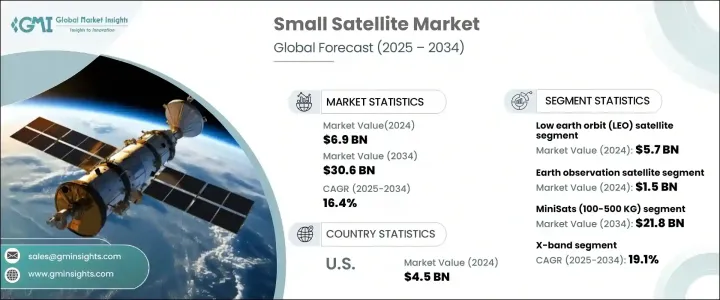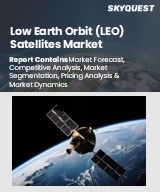
|
시장보고서
상품코드
1716631
소형 위성 시장 기회, 성장 촉진요인, 산업 동향 분석 및 예측(2025-2034년)Small Satellite Market Opportunity, Growth Drivers, Industry Trend Analysis, and Forecast 2025 - 2034 |
||||||
세계의 소형 위성 시장은 2024년에는 69억 달러로 평가되었습니다. 우주 발사 증가와 다양한 산업 분야에서의 용도 확대에 견인되어 2025년부터 2034년에 걸쳐 CAGR 16.4%를 나타내 견조한 성장이 전망되고 있습니다.
우주가 더욱 가까워짐에 따라 세계 기업과 정부 기관은 통신, 지구관측, 네비게이션, 과학 연구를 강화하기 위해 선진 위성 기술에 많은 투자를 실시했습니다.

이러한 위성은 기존의 대형 위성에 비해 소형, 경량, 신속한 전개가 가능하며, 상업, 방위, 과학 목적에 매우 적합합니다. 개선, 구성 요소의 소형화, 발사 기술의 진보도 위성 배치를 보다 저렴하고 효율적인 것으로 하고 있습니다.
| 시장 범위 | |
|---|---|
| 시작 연도 | 2024년 |
| 예측 연도 | 2025-2034년 |
| 시작 금액 | 69억 달러 |
| 예측 금액 | 306억 달러 |
| CAGR | 16.4% |
궤도 유형에서는 저궤도(LEO) 위성이 2024년 시장을 독점해 금액으로 57억 달러를 차지했습니다. LEO 위성은 원격지에서의 광대역 연결을 지원하고, 세계 통신을 강화하고, 환경 변화, 도시 개발, 해양 활동의 실시간 감시를 용이하게 하는 데 필수적입니다.
다양한 응용 분야에서 지구관측은 주요 부문으로 부상하여 2024년에는 15억 달러의 수익을 창출했습니다. 소형 위성은 농업과 임업에서 방어 및 도시 계획에 이르기까지 광범위한 산업에 매우 중요한 최신 정보를 수집하기 위해 점점 더 많이 사용되고 있습니다.
미국의 소형 위성 시장만으로도 2024년 시장 규모는 45억 달러에 이르렀으며, 세계적으로 보아도 우세한 지위를 굳히고 있습니다. 그리고 위성의 기술 혁신과 배치를 이끌고 있습니다. 방위, 통신, 과학 탐사에 대한 투자가 증가하는 가운데, 미국 시장은 지속적인 확대 태세에 있어, 급속하게 진화하는 소형 위성 분야에서의 주도권을 강화하고 있습니다.
목차
제1장 조사 방법과 조사 범위
제2장 주요 요약
제3장 업계 인사이트
- 생태계 분석
- 업계에 미치는 영향요인
- 성장 촉진요인
- 우주에서의 발사 건수 증가
- 소형 위성 및 로켓 추진 기술의 진보
- 연구개발 및 위성 발사에 있어서 비공개회사의 급증
- LEO 위성의 보급 확대
- 위성 기반 서비스에 대한 수요 증가
- 업계의 잠재적 위험 및 과제
- 소형 위성 전용 로켓의 부족
- 소형 위성에 관한 표준적인 규제의 부족
- 성장 촉진요인
- 성장 가능성 분석
- 규제 상황
- 기술 상황
- 향후 시장 동향
- 갭 분석
- Porter's Five Forces 분석
- PESTEL 분석
- 구성 요소 분석
- 위성버스
- 페이로드
- 전력 시스템
- 추진 시스템
제4장 경쟁 구도
- 서론
- 기업 점유율 분석
- 주요 시장 기업의 경쟁 분석
- 경쟁 포지셔닝 매트릭스
- 전략 대시보드
제5장 시장 추계·예측 : 위성 유형별(2021-2034년)
- 주요 동향
- 피코 위성(1Kg 미만)
- 나노 위성(1-10kg)
- 마이크로샛(11-100kg)
- 미니샛(100-500kg)
제6장 시장 추계·예측 : 궤도별(2021-2034년)
- 주요 동향
- 저궤도(LEO)
- 중궤도(MEO)
- 정지궤도(GEO)
- 기타
제7장 시장 추계·예측 : 용도별(2021-2034년)
- 주요 동향
- 지구 관측
- 통신
- 기술 개발
- 우주 연구
- 내비게이션
- 기타
제8장 시장 추계·예측 : 주파수별(2021-2034년)
- 주요 동향
- L 밴드
- S 밴드
- C 밴드
- X 밴드
- Ku 밴드
- Ka 밴드
- Q/V 밴드
제9장 시장 추계·예측 : 최종 용도별(2021-2034년)
- 주요 동향
- 상업
- 통신
- 운송 및 물류
- 미디어 및 엔터테인먼트
- 기타
- 군사 및 방위
- 정부(법 집행 기관 및 국토 안보)
- 대학
제10장 시장 추계·예측 : 지역별(2021-2034년)
- 주요 동향
- 북미
- 미국
- 캐나다
- 유럽
- 독일
- 영국
- 프랑스
- 스페인
- 이탈리아
- 네덜란드
- 아시아태평양
- 중국
- 인도
- 일본
- 호주
- 한국
- 라틴아메리카
- 브라질
- 멕시코
- 아르헨티나
- 중동 및 아프리카
- 사우디아라비아
- 남아프리카
- 아랍에미리트(UAE)
제11장 기업 프로파일
- AAC Clyde Space
- Airbus SE
- Apex
- Blue Canyon Technologies
- GomSpace
- Lockheed Martin Corporation
- NanoAvionics
- Nara Space
- Northrop Grumman
- OHB SE
- Planet Labs PBC
- Rocket Lab USA
- SNC
- SpaceX
- Spire Global
- Surrey Satellite Technology Ltd
- SWISSto12
- Thales
The Global Small Satellite Market was valued at USD 6.9 billion in 2024 and is expected to grow at a robust CAGR of 16.4% between 2025 and 2034, driven by an increasing number of space launches and expanding applications across various industries. As space becomes more accessible, companies and government agencies worldwide are heavily investing in advanced satellite technologies to enhance communications, earth observation, navigation, and scientific research. The small satellite segment, in particular, is gaining immense traction due to its cost-effectiveness, versatility, and ability to provide high-quality data in real-time.

These satellites are smaller, lighter, and quicker to deploy compared to traditional large satellites, making them highly suitable for commercial, defense, and scientific purposes. The growing trend of satellite constellations, where multiple small satellites work together to offer global coverage, is further pushing the boundaries of what small satellites can achieve. The market is also benefiting from continuous improvements in satellite design, miniaturization of components, and advancements in launch technologies, which together are making satellite deployment more affordable and efficient. As companies look to leverage satellite data for applications like the Internet of Things (IoT), smart agriculture, disaster management, and climate monitoring, the demand for small satellites is projected to accelerate significantly in the coming years.
| Market Scope | |
|---|---|
| Start Year | 2024 |
| Forecast Year | 2025-2034 |
| Start Value | $6.9 Billion |
| Forecast Value | $30.6 Billion |
| CAGR | 16.4% |
In terms of orbit type, Low Earth Orbit (LEO) satellites dominated the market in 2024, accounting for USD 5.7 billion in value. LEO remains the preferred choice for satellite deployment due to its proximity to Earth, which ensures faster data transmission, reduced latency, and lower launch costs. The popularity of LEO satellites is fueled by their critical role in modern communication networks, earth observation, and remote sensing services. They are essential for supporting broadband connectivity in remote regions, enhancing global communications, and facilitating real-time monitoring of environmental changes, urban development, and maritime activities. The push for global connectivity, particularly in underserved areas, has led to increased satellite launches in LEO, marking it as a key contributor to the industry's growth.
Among the various applications, Earth observation emerged as a leading segment, generating USD 1.5 billion in revenue in 2024. The heightened demand for high-resolution imagery and real-time data collection to monitor environmental changes, manage agricultural practices, and respond to natural disasters is fueling this segment's growth. Small satellites are increasingly used to gather precise, up-to-date information crucial for industries ranging from agriculture and forestry to defense and urban planning. Their ability to provide timely, actionable insights has made them indispensable for governments and private organizations seeking advanced monitoring capabilities.
The U.S. Small Satellite Market alone was valued at USD 4.5 billion in 2024, cementing its position as a dominant player in the global landscape. The country's dynamic space sector, fueled by both private enterprises and government initiatives, continues to lead in satellite innovation and deployment. With rising investments in defense, communication, and scientific exploration, the U.S. market is poised for sustained expansion, reinforcing its leadership in the rapidly evolving small satellite arena.
Table of Contents
Chapter 1 Methodology and Scope
- 1.1 Market scope and definitions
- 1.2 Research design
- 1.2.1 Research approach
- 1.2.2 Data collection methods
- 1.3 Base estimates and calculations
- 1.3.1 Base year calculation
- 1.3.2 Key trends for market estimation
- 1.4 Forecast model
- 1.5 Primary research and validation
- 1.5.1 Primary sources
- 1.5.2 Data mining sources
Chapter 2 Executive Summary
- 2.1 Industry 3600 synopsis
Chapter 3 Industry Insights
- 3.1 Industry ecosystem analysis
- 3.2 Industry impact forces
- 3.2.1 Growth drivers
- 3.2.1.1 Growing number of launch activity in space
- 3.2.1.2 Technological advancements in small satellite and rocket propulsion
- 3.2.1.3 Proliferation of private space companies in R&D and satellite launches
- 3.2.1.4 Increasing prevalence of LEO satellites
- 3.2.1.5 Rising demand for satellite-based services
- 3.2.2 Industry pitfalls and challenges
- 3.2.2.1 Shortage of small satellite dedicated launch vehicle
- 3.2.2.2 Lack of standard regulations for small satellites
- 3.2.1 Growth drivers
- 3.3 Growth potential analysis
- 3.4 Regulatory landscape
- 3.5 Technology landscape
- 3.6 Future market trends
- 3.7 Gap analysis
- 3.8 Porter's analysis
- 3.9 PESTEL analysis
- 3.10 Component analysis
- 3.10.1 Satellite bus
- 3.10.2 Payload
- 3.10.3 Power system
- 3.10.4 Propulsion system
Chapter 4 Competitive Landscape, 2024
- 4.1 Introduction
- 4.2 Company market share analysis
- 4.3 Competitive analysis of major market players
- 4.4 Competitive positioning matrix
- 4.5 Strategy dashboard
Chapter 5 Market Estimates and Forecast, By Satellite Type, 2021 - 2034 ($ Mn)
- 5.1 Key trends
- 5.2 Pico-satellite (Less than 1 Kg)
- 5.3 NanoSats (1–10 kg)
- 5.4 MicroSats (11–100 kg)
- 5.5 MiniSats (100-500 KG)
Chapter 6 Market Estimates and Forecast, By Orbit, 2021 - 2034 ($ Mn)
- 6.1 Key trends
- 6.2 Low earth orbit (LEO)
- 6.3 Medium earth orbit (MEO)
- 6.4 Geostationary orbit (GEO)
- 6.5 Others
Chapter 7 Market Estimates and Forecast, By Application, 2021 - 2034 ($ Mn)
- 7.1 Key trends
- 7.2 Earth observation
- 7.3 Communication
- 7.4 Technology development
- 7.5 Space research
- 7.6 Navigation
- 7.7 Others
Chapter 8 Market Estimates and Forecast, By Frequency, 2021 - 2034 ($ Mn)
- 8.1 Key trends
- 8.2 L-Band
- 8.3 S-Band
- 8.4 C-Band
- 8.5 X-Band
- 8.6 Ku-Band
- 8.7 Ka-Band
- 8.8 Q/V-Band
Chapter 9 Market Estimates and Forecast, By End Use, 2021 - 2034 ($ Mn)
- 9.1 Key trends
- 9.2 Commercial
- 9.2.1 Telecommunication
- 9.2.2 Transportation & logistics
- 9.2.3 Media & entertainment
- 9.2.4 Others
- 9.3 Military & defense
- 9.4 Government (Law enforcement & homeland security)
- 9.5 Universities
Chapter 10 Market Estimates and Forecast, By Region, 2021 - 2034 ($ Mn)
- 10.1 Key trends
- 10.2 North America
- 10.2.1 U.S.
- 10.2.2 Canada
- 10.3 Europe
- 10.3.1 Germany
- 10.3.2 UK
- 10.3.3 France
- 10.3.4 Spain
- 10.3.5 Italy
- 10.3.6 Netherlands
- 10.4 Asia Pacific
- 10.4.1 China
- 10.4.2 India
- 10.4.3 Japan
- 10.4.4 Australia
- 10.4.5 South Korea
- 10.5 Latin America
- 10.5.1 Brazil
- 10.5.2 Mexico
- 10.5.3 Argentina
- 10.6 Middle East and Africa
- 10.6.1 Saudi Arabia
- 10.6.2 South Africa
- 10.6.3 UAE
Chapter 11 Company Profiles
- 11.1 AAC Clyde Space
- 11.2 Airbus SE
- 11.3 Apex
- 11.4 Blue Canyon Technologies
- 11.5 GomSpace
- 11.6 Lockheed Martin Corporation
- 11.7 NanoAvionics
- 11.8 Nara Space
- 11.9 Northrop Grumman
- 11.10 OHB SE
- 11.11 Planet Labs PBC
- 11.12 Rocket Lab USA
- 11.13 SNC
- 11.14 SpaceX
- 11.15 Spire Global
- 11.16 Surrey Satellite Technology Ltd
- 11.17 SWISSto12
- 11.18 Thales



















